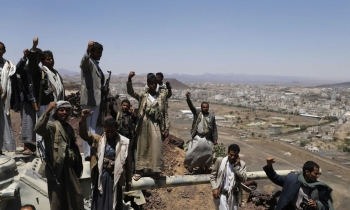In the news business, it is often easier to make headlines than money. Prannoy Roy is unusual in that he does both. Last year he created waves in India by jumping off Rupert Murdoch's Star network where his New Delhi TV had provided 24-hour rolling news for five years.
"The first line of our contract read 'editorial control remains with NDTV'. When we came to renewing it, Star wanted to run things their way so we agreed to disagree. We had a drink and went our own way," said Mr Roy.
A canny businessman, Mr Roy had sensed an opportunity by leaving Star and created his own channel in competition with Mr Murdoch. An Indian financial institution picked up 18% of the company and Mr Roy also persuaded Standard Chartered to put up a further $12m (£6.6m) for 14% of the shares.
The former economist also tapped the stock market in Mumbai (formerly Bombay) for 1bn rupees (£12.5m) in April. A familiar face on his own programmes, shareholders were convinced that Mr Roy would succeed in providing profits from television news.
Their faith has been vindicated. Mr Roy's two channels - NDTV, which broadcasts in English, and NDTV India, whose programming is in Hindi - have established themselves as the number one and number two channels in their sectors. His recent quarterly results, £1m profit from £5m of advertising revenue, also buoyed investor sentiment.
Resolutely upmarket in its production values and the stories it chooses to cover, NDTV's rise can also boast having pushed Star News into a distant fourth place. Many media commentators had prophesised that Mr Roy's venture would be blown out of the water by Star News's cash.
Domination by politics and business stories often makes watching NDTV a little like sitting through an extended Newsnight, but Mr Roy is unapologetic about the seriousness of the journalism.
"The good thing about this business is that viewers respect professionalism, they respect independence, and they know it is not just about money. We have been consistently credible over many years. The people like that," he says.
Mr Roy's serious programming means that he turned down a recent scoop, involving hidden cameras, about paedophiles in India. NDTV also has a reputation for holding back its stories until they are confirmed - almost unheard of in the cut-throat world of Indian television.
"We were offered the paedophile story first but I found it a little over the top. It was, I felt, a little too exploitative and really the film should have been shown to the police first so that they could have arrested the culprits. To expose corruption is fine. I just find it unethical to use children to get viewership."
If this all seems a little high-minded, it is worth remembering that India's democracy has always encouraged intellectual pursuits to operate in a marketplace of ideas. It has only recently become influenced by profits and losses.
The result is that India's television landscape is now a different country from that encountered by the viewer a decade ago. A country that took 50 years to provide 8m telephone lines to 900 million people suddenly spawned 50m cable homes after satellite television arrived.
Until 1992 television was the preserve of the lumbering state broadcaster, Doordarshan. Now 10 new news channels launch every year and it is estimated 44 mini-CNNs beam into India 24 hours a day, seven days a week. Many of the new stations grew out of news programmes commissioned by Doordarshan, which started outsourcing production work in the early 1990s as India liberalised.
"NDTV began life as the first nightly news show on the state broadcaster. I remember saying we are live on air and mentioning the time and the next day I got a call from the information ministry asking us not to scare people with the thought of live television news."
Another reason for the fizziness in Indian television is the plummeting cost of technology. "Five years ago to rent space on a satellite annually would cost you $3m, today it costs just $300,000. Cameras cost you one tenth of the price now. The same with editing suites. You are looking at a 75% to 90% drop in the cost in starting a news channel."
Cable arrived in a big way in India by 1989, followed a year or two later by satellite, helped by the first Gulf war. These days the television is India's hottest piece of real estate. Star has announced plans to bring Sky-style set-top boxes to Indian living rooms and a plethora of new technologies, such as TiVo-type products, tantalisingly close to the market. For Mr Roy, new technologies offer new ways of making money. Cable penetration is only 50% which, he says, is a number that will inevitably rise. There is also the fact that subscription will be increasingly important as set-top boxes become prevalent.
Mr Roy also cites India's insatiable thirst for politics as a reason for his news channel's success. "If you look at front pages of Delhi's newspapers, 80-90% are politics. I would say newspapers around the world have less than half by comparison. In India, the main topic of discussion at most social gatherings is politics. Everybody has the answer to India's problems and they are dying to tell you."
There is another more Murdochian explanation why the subcontinent views politics as a pastime. "Sports is not developed here. Just look at the Olympics [India's medal tally was a solitary silver]. In England the office discussion will be about which football team won last night. Here there is very little interest in even the cricket national league. Politics is our sports. If politicians want to get out of the media lens then they should develop sports in the country."
His latest project appears to be a busi ness channel to challenge the market leader, CNBC, which is run by US network NBC and is backed by General Electric. India's middle classes are entranced by the country's £150bn stock market and Mr Roy has threatened CNBC by running seven hours of continuous business news. "We are ahead of CNBC from 1 to 4 o'clock during the day. [A new business channel] is a possibility."
With an Irish mother and seven years at university in London, Mr Roy is a self-styled global Indian. He can effortlessly hold forth on British newspapers and US cable structures. NDTV, he says, is looking at a deal to beam into Britain. "The real interest here in India is on four countries - China, Pakistan, England, America. These dominate 80% of the public consciousness."
A proto-media mogul, Mr Roy can at times sound like his former partner, Rupert Murdoch. "Given the size of the Diaspora in say America, Africa or South East Asia there is certainly an audience for a global channel for the global Indian." But for now, India appears a big enough country to conquer. "It is something we will look at, but in the future."









